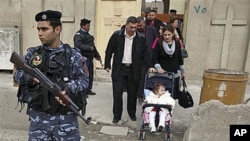With al-Qaida threatening more attacks against Iraq's beleaguered Christian community, Christian leaders in three unsettled regions of the country are calling off Christmas celebrations this year.
Life for Christians across Iraq has been increasingly treacherous in recent months, and many fear for their lives and futures following a brutal and bloody hostage-taking that left nearly 70 people dead last month at Baghdad's Sayidet al Najat Church.
Under threat, and in mourning for recent attacks against their community, Iraqi Christian leaders have decided to cancel most evening worship services and forgo other festivities for Christmas.
Church leaders in the northern towns of Kirkuk and Mosul, as well as the southern port city of Basra, are reported to be canceling the traditional Christmas evening mass and have asked parishioners not to put up decorations.
Chaldean Archbishop Louis Sako in Kirkuk said church leaders across the country - not just in Kirkuk, Mosul and Basra - made an official decision recently to forgo celebrations.
"This decision was taken by all the bishops in Iraq, not only in Kirkuk, two weeks ago, because after the attack on the (Sayidat al Najat) church in Baghdad many families left the capital, and also (in) Mosul, Christians have been martyred. So, we made a statement that we canceled all the celebrations, except the masses, in the church and that prayer should be for peace and stability in Iraq."
Archbishop Sako added that his church and others received warning letters from al-Qaida, which were published on the terrorist group's website.
"I did not make any statement about al-Qaida, really, but we got a letter (which) was published on the website of al-Qaida, asking us to be wise and not to deal with the Americans, and also to ask for the release of two ladies in Egypt," said Sako. "They were Copts and they became Muslim. (But) we do not have any relations with Egypt. The third thing was not to defend (former Deputy Prime Minister) Tarek Aziz."
Muslim extremists in Egypt say the Church has detained two women for allegedly converting to Islam. The Church denies the allegations, but extremists in Iraq have embraced the story.
The Archbishop noted that another important reason for canceling Christmas evening mass is the fragile security situation in many parts of Iraq.
"You know, the security is still fragile, therefore we do not have the right to expose the lives of our faithful to a risk," said Sako. "For that, we are celebrating only the masses during the day. During the night (it is) impossible, because we have no guarantee you know. Who can protect Christians? Maybe inside the churches the police are protecting, but when (people) are leaving the church to their houses during the night it is really dangerous. But not only in Kirkuk, but in Baghdad, in Mosul, and in Basra. Only in Kurdistan is security good, (so) there we will be celebrating mass at night."
Many Christian families have fled parts of Baghdad and other dangerous areas of the country for the safety of Iraqi Kurdistan in recent weeks.
The Archbishop, who is also the Chaldean archbishop of Suleimaniyah, indicated that his church has 112 refugee families that have fled from Baghdad, including 30 families who have actually taken refuge inside his church.




